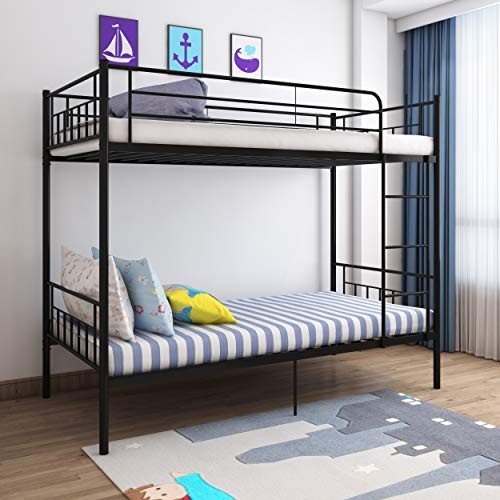Why You Should Concentrate On Improving Bunk Beds
Exploring Bunk Beds: A Comprehensive Guide
Bunk beds have long been a staple in children's bed rooms, dorm rooms, and even homes with restricted space. Not only do they provide a useful sleeping solution, however they likewise develop a fun and imaginative environment for children and a great space-saver for adults and families. visit this weblink will check out everything you require to understand about bunk beds, from types and materials to safety ideas and purchasing advice.
Tabulation
- Kinds Of Bunk Beds
- Standard Bunk Beds
- Loft Beds
- Triple Bunk Beds
- L-Shaped Bunk Beds
- Material Options
- Wood
- Metal
- Safety Considerations
- Buying Guide
- FAQs
Types of Bunk Beds
Bunk beds come in numerous styles to fit various needs and choices. Here's a breakdown of the most typical types:
Conventional Bunk Beds
Conventional bunks normally include two beds stacked vertically on top of one another. These beds are ideal for siblings sharing a space or for making the most of sleeping space in visitor spaces.
Loft Beds
Loft beds stand likewise to standard bunk beds however do not have a lower sleeping area. Rather, they often incorporate a desk or seating area underneath, making them a great option for little rooms needing multifunctionality.
Triple Bunk Beds
Triple bunk beds are designed for three residents, with beds stacked in a three-tier setup. These are less typical but can be a fun option for large households or slumber parties.
L-Shaped Bunk Beds
With one bed positioned horizontally and the other vertically, L-shaped bunk beds are frequently equipped with extra features such as desks or storage drawers and can complement corner areas in a space.
Contrast of Bunk Bed Types
Bed Type
Suitable Use
Description
Traditional
Shared bedrooms or guest spaces
2 beds stacked vertically
Loft
Little spaces needing multi-purpose space
Upper bed with open space below
Triple
Large families or slumber parties
Three beds stacked vertically
L-Shaped
Corner or flexible areas
A combination of vertical and horizontal beds
Product Options
Bunk beds are made from various materials, with wood and metal being the most typical. Each material has its advantages and disadvantages.
Wood
- Toughness: Generally robust and can withstand years of usage.
- Aesthetic Appeal: Offers a traditional look that can blend with numerous decors.
- Weight Capacity: Typically tougher; can support much heavier weights.
- Drawbacks: May be more costly than metal options and can be susceptible to scratches.
Metal
- Strength: Generally light-weight and easy to move however still durable.
- Modern Design: Often comes in streamlined styles, making it appealing for contemporary spaces.
- Cost-efficient: Usually more economical than wooden alternatives.
- Downsides: Can be cold to the touch in winters and may not have the exact same visual appeal for some buyers.
Security Considerations
When it comes to bunk beds, security can not be neglected. Here are crucial safety pointers to bear in mind:
- Guardrails: Ensure that the top bunk has guardrails on both sides to avoid falls.
- Durable Construction: Check for a strong develop and tough materials to endure weight and movement.
- Weight Limit: Adhere to the maker's weight limitation for both the upper and lower bunks.
- Ladder Design: Choose bunks with a safe, easy-to-climb ladder and prevent any sharp edges or rungs.
- Age Restrictions: Most producers advise that kids under the age of six ought to not sleep in the upper bunk.
Purchasing Guide
When searching for bunk beds, consider the list below factors to discover the very best suitable for your requirements:
- Space Availability: Measure the space size and ceiling height, guaranteeing there is appropriate space for the top bunk.
- Bed Size: Decide in between twin, complete, or bigger sizes based upon your requirements and the size of the room.
- Design Preference: Consider the overall design of the bed room to find an ideal design.
- Alleviate of Setup: Look for a bunk bed that is straightforward to put together.
- Spending plan: Bunk beds can be found in numerous rate varieties, so determine a spending plan before starting your search.
FAQs
1. What is the suggested age for kids to sleep on the top bunk?
Children aged 6 and older are typically advised to sleep on the top bunk to lessen the risk of falls.
2. How can I make my bunk bed more secure?
To improve security, make sure guardrails are correctly set up and check that the bed is put on a flat surface. In addition, motivate children to use the ladder carefully.
3. Can I convert a bunk bed into 2 different beds?
Numerous bunk beds are designed to be convertible. Inspect the producer's requirements for convertibility functions.
4. What accessories are offered for bunk beds?
Typical devices include bed linens, storage drawers, staircases instead of ladders, and tented canopies for a fun visual appeal.
5. How do I maintain my bunk bed?
Regular checks for loose screws or structural integrity can help ensure security. Dust the bed frequently and clean spills promptly to keep the materials in good condition.
Bunk beds are versatile and a space-efficient option for different living situations, from kids's rooms to visitor lodgings. With numerous designs and products offered, potential purchasers have a wealth of choices to think about, making sure a combination of functionality and aesthetics. By prioritizing security and following the ideas detailed in this guide, people can discover the best bunk bed that fits their space and lifestyle, all while developing an enjoyable sleeping environment.
